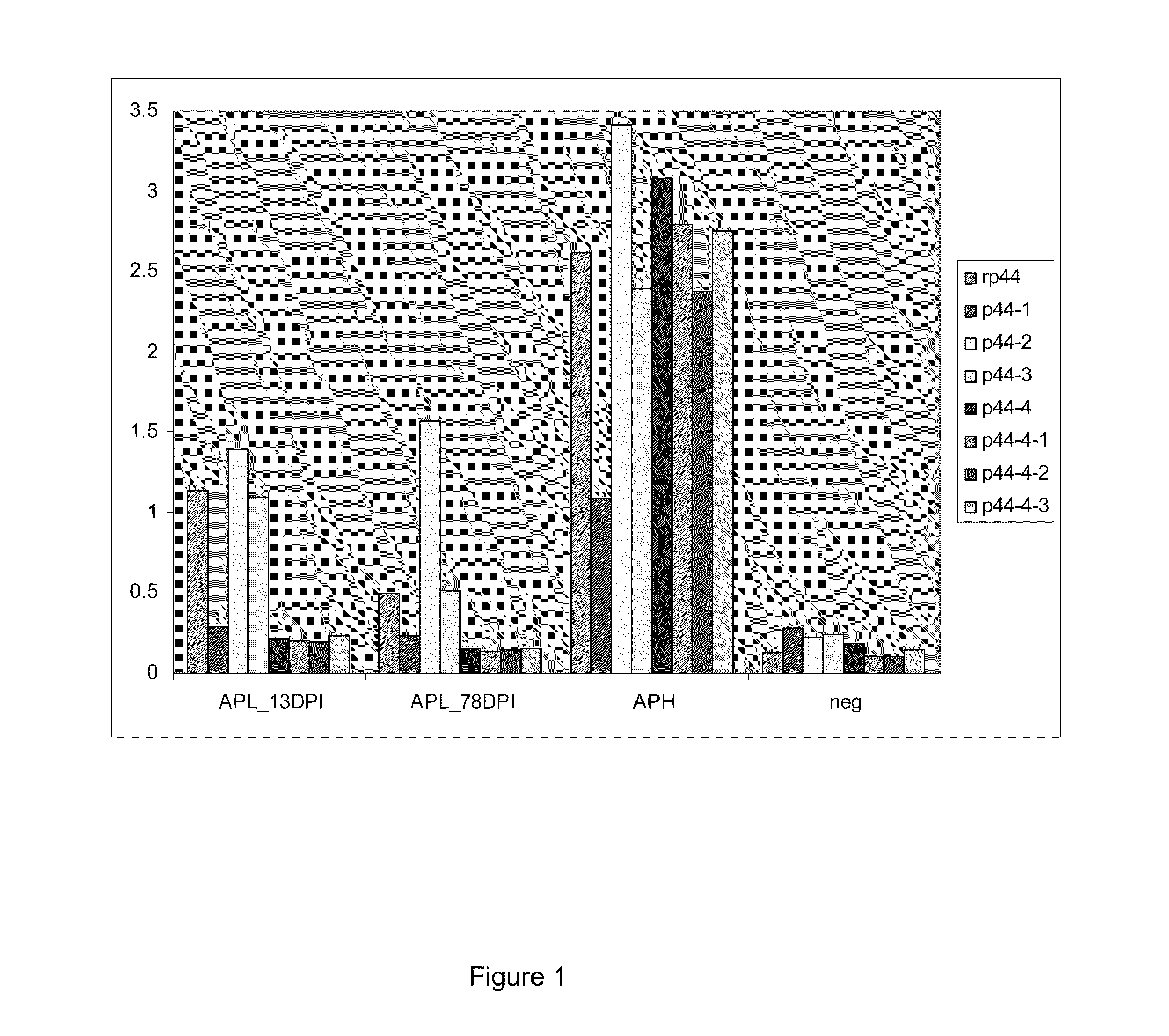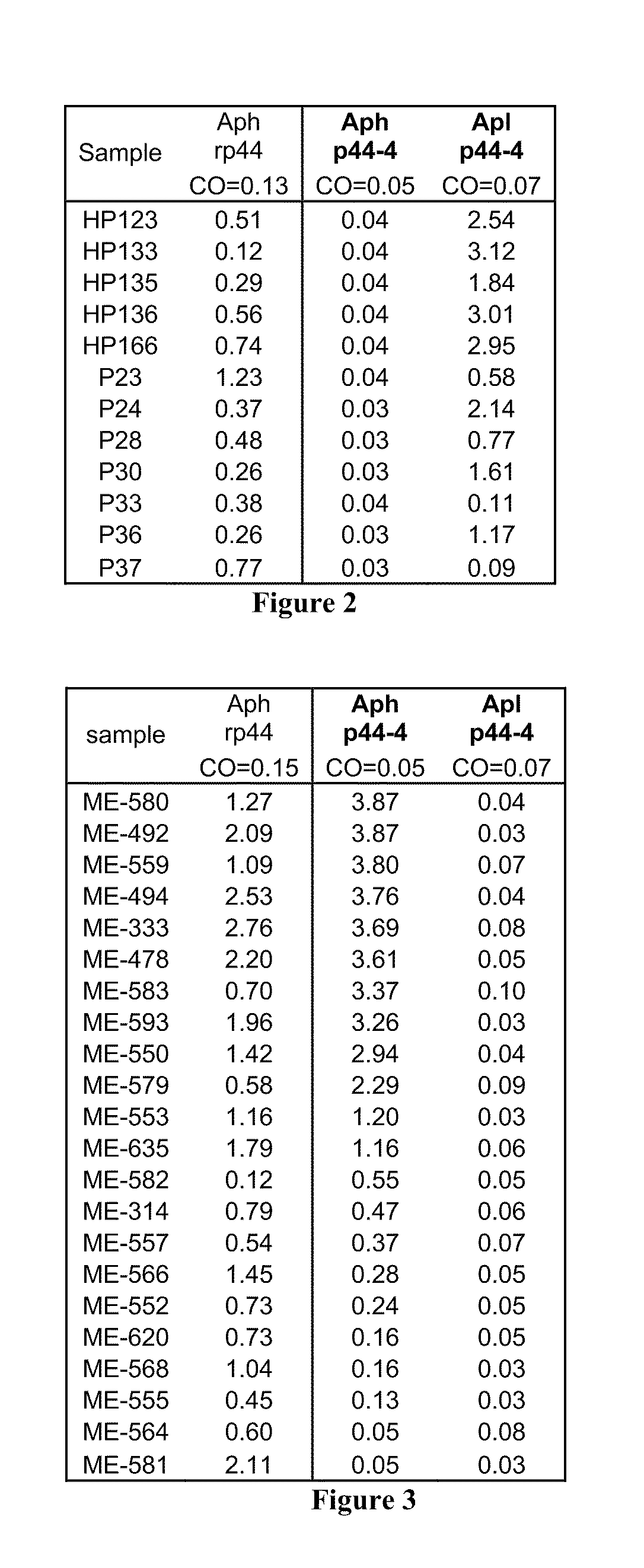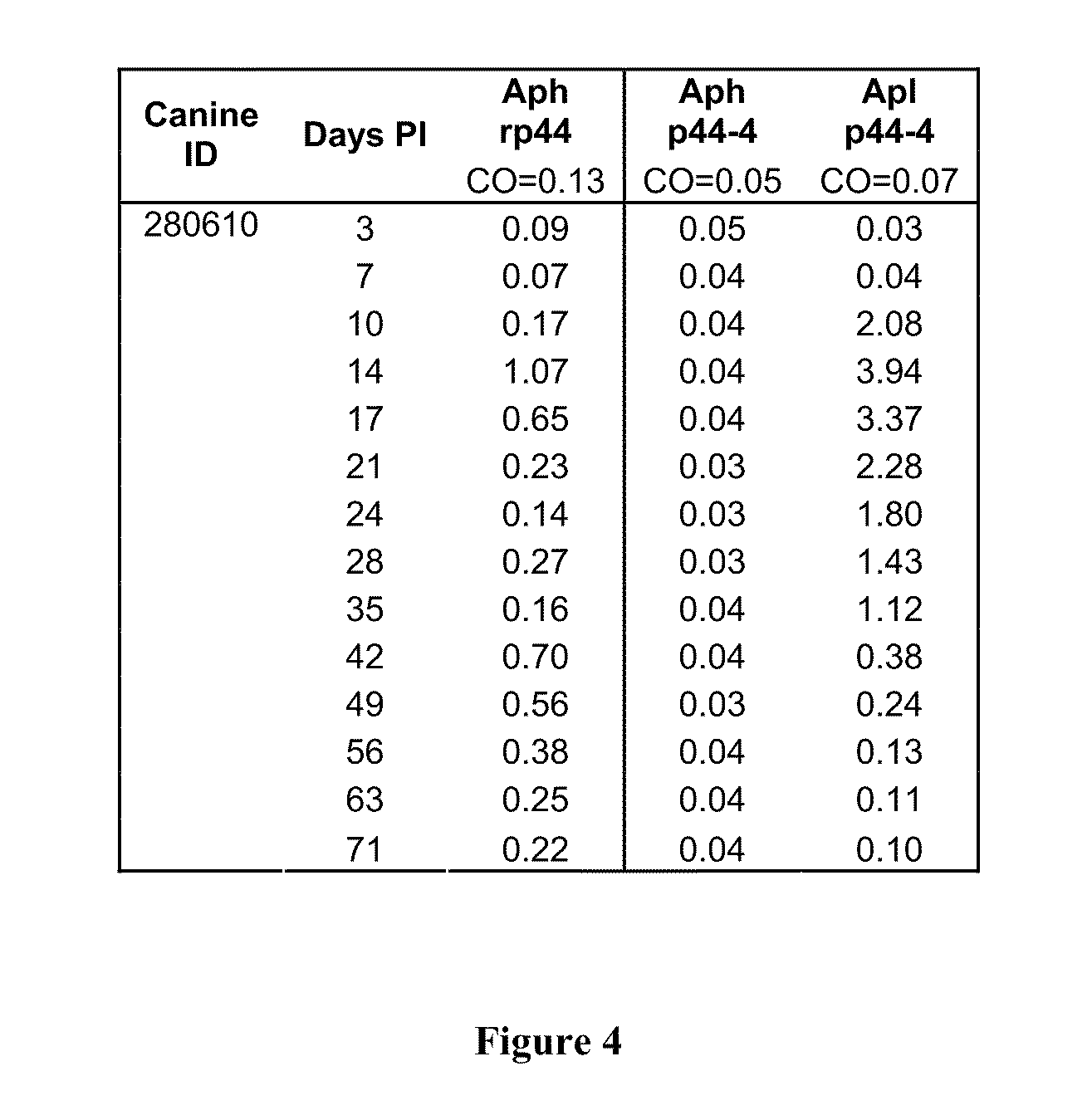Compositions and methods for detection of antibodies specific for Anaplasma phagocytophilum (Aph) and Anaplasma platys (Apl)
a technology of anaplasma which is applied in the field of compositions and methods for detection of antibodies specific for anaplasma phagocytophilum and anaplasma platys, can solve the problems of clinically ill patients and the inability of anaplasma /i>to differentiate the two species, and achieves the effects of facilitating purification, facilitating polypeptide stability, and enhancing immune respons
- Summary
- Abstract
- Description
- Claims
- Application Information
AI Technical Summary
Benefits of technology
Problems solved by technology
Method used
Image
Examples
example 1
Detection of Anti-Aph and Anti-Apl Antibodies with Polypeptides Derived from the Aph p44 Protein
[0126]Polypeptides shown in SEQ ID NOs:12-18 and 10 were coated at 0.5m / mL on Immulon® 4 microtiter plates in carbonate buffer pH 9.6, overnight. For all examples, the polypeptide shown in SEQ ID NO:10 has an N at position 143, an A at position 145, and an I at position 156.
[0127]The plates were washed twice with PetChek® wash buffer. The plates were blocked with 2% TWEEN® 20 (polysorbate) / 2.5% sucrose in 0.1M Tris pH 7.6, 2 h and then dried with desiccant overnight. A 1:200 dilution of test samples in conjugate diluent were added to the plates and incubated for 40 minutes. The plates were washed 6 times with PetChek® wash buffer. HRP-conjugated rabbit anti-dog IgG (H+L) (Jackson ImmunoResearch Laboratories, Inc., West Grove, Pa.; Cat. No. 304-035-003), diluted 1:2000 in conjugate diluent, was added to the plates and incubated for 40 minutes. The plates were washed 6 times with PetChek® w...
example 2
Species Specific Detection of Aph or Apl in Field Samples from Endemic Areas
[0134]Polypeptides (Aph p44-4 and Apl p44-4 at 0.5 μg / mL; Aph rp44 at 0.25 μg / mL) were coated on Immulon® 4 plates in carbonate buffer pH 9.6, overnight. The plates were washed 2× with PetChek® wash buffer and then blocked with 2% TWEEN® 20 (polysorbate) / 2.5% Sucrose in 0.1M Tris pH 7.6 for 2 hours. The plates were dried with desiccant overnight. A 25 μL test sample was mixed with 50 μL peptide:HRP conjugate (0.5 μg / mL for the p44-4-Aph (SEQ ID NO:15):HRP conjugate, 1 μg / mL for the p44-4-Apl (SEQ ID NO:19):HRP conjugate, and 3 μg / mL for Aph rp44 conjugate) and incubated on the microtiter plate (incubation time was 1 hour in the experiment shown in FIG. 2, and 1 hour 45 minutes in the experiment shown in FIG. 3. The plates were washed 6 times with PetChek® wash buffer. 60 μl of TMB was added to the plates and incubated for 10 minutes. 50 μl of Stop solution was added and the A650 was determined. The cut off v...
example 3
Time Course Response in an Apl Experimental Infection Model
[0137]Polypeptides (Aph p44-4 and Apl p44-4 at 0.5 μg / mL; Aph rp44 at 0.25 μg / mL) were coated on Immulon® 4 microtiter plates in carbonate buffer pH 9.6, overnight. The plates were washed 3 times with PetChek® wash buffer. The plates were blocked with 2% TWEEN® 20 (polysorbate) / 2.5% sucrose in 0.1M Tris pH 7.6, 2 h and left to dry overnight. A 25 μL test sample was mixed with 50 μL peptide:HRP conjugate (0.5 μg / mL for Aph p44-4 conjugate, 1 μg / mL for Apl p44-4 conjugate, and 3 μg / mL for Aph rp44 conjugate) and incubated on the microtiter plate for 1 hour. The plates were washed 6 times with PetChek® wash buffer. 60 μl of TMB was added and allowed to incubate for 10 minutes. 50 μl of Stop solution was added and the A650 was determined. The results are shown in FIG. 4.
[0138]The results demonstrate that SEQ ID NO:19 (Apl p44-4) can be used to detect Apl infections. SEQ ID NO:19 can detect Apl infection at about 10 days post-inf...
PUM
| Property | Measurement | Unit |
|---|---|---|
| temperatures | aaaaa | aaaaa |
| temperatures | aaaaa | aaaaa |
| pH | aaaaa | aaaaa |
Abstract
Description
Claims
Application Information
 Login to View More
Login to View More - R&D
- Intellectual Property
- Life Sciences
- Materials
- Tech Scout
- Unparalleled Data Quality
- Higher Quality Content
- 60% Fewer Hallucinations
Browse by: Latest US Patents, China's latest patents, Technical Efficacy Thesaurus, Application Domain, Technology Topic, Popular Technical Reports.
© 2025 PatSnap. All rights reserved.Legal|Privacy policy|Modern Slavery Act Transparency Statement|Sitemap|About US| Contact US: help@patsnap.com



